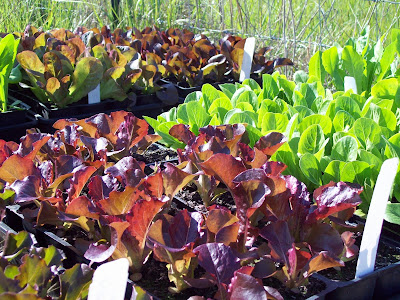We are now accepting CSA
subscriptions for our 2020 season. We have a limited number of spots so, if interested please reserve your subscription.
Here's a description of our CSA:
 |
| Llyn and Chris-Your local 'farm'acists. |
What is a CSA? A CSA (Community Supported
Agriculture) is a membership-relationship between you and a farm.
Members receive a "share" of seasonally available produce, on a weekly
basis. This gives you the benefit of superb freshness, knowing where your food comes from,
how it is grown, and that you are giving direct support to the people
who grow your food.
Your subscription will bring fresh and local food to your family while
supporting us in our mission
to donate healthy produce to people in our community, through local
food charities (3,399 pounds in 2019). We
focus on familiar, staple crops; the things that are most popular at grocery stores and farmer's markets.
 |
| Home-grown fresh! |
What's in my box? In the beginning of the
season, boxes are less full as there are not as many crops ready for
harvest in the spring. Over the course of the summer and into the fall,
the boxes increase in the amount that's included so, over the course of
the season, you receive generous value for your membership.
May, June: Beets, cabbage, carrots, chard, onions, kale, lettuce and radishes
July: same as above, AND early tomatoes. summer squash, garlic and cucumbers
August, Sept.: same as above, AND green beans, celery, large tomatoes, peppers, apples, pears, plums, blackberrries and grapes
Oct., Nov.: Most of above, AND winter squash and potatoes.
Dates of the season: The Sharing Gardens CSA provides weekly boxes of fruits and vegetables
from May until November as it is available.
How much is in my box?
At the height of the season, each member receives enough produce to
feed the average family of four. We cannot customize boxes but if you
are receiving more produce than you can consume, we encourage you to be
generous with your friends and neighbors so it doesn't go to waste.
Each member will be added to our special CSA email-list
and receive recipes and ideas for using the produce provided. We ask
members to check their email regularly so as not to miss our
communications.
 |
| Lettuce grown from seed we saved. |
How do we grow your food?
No herbicides or pesticides
Soil-fertility is created primarily through compost, worm castings, leaves, grass-clippings and wood-ash.
Slow-grown for maximum
density of nutrition and flavor.
We
encourage birds and beneficial insects for
natural pest-management.
We grow all
heirloom varieties (
no hybrids or GMO) from 85% (or more) of
seed we saved ourselves.
Commitment to living lightly on the Earth: Each weekly box will have a
large, plastic liner that all - but a few items - will be placed in
without separate plastic-bags. Liners will be re-usable. Less plastic -
better for the Earth!
Thank you for helping us reduce our environmental footprint.
 |
| Healthy food for you and your family! |
Cost of season's 'shares': $700 (payable either
in full
- when you sign-up, or in two payments of $400 - when you sign up, and
$300 by July 1st). This works out to about $25/week.
Payment methods: We can accept cash or checks made out to 'The Sharing Gardens'.
Where do I pick up my box? Members in the Monroe area will be able to pick up their boxes on Wed. afternoons from 1:00 to 5:00 at the Sharing Gardens.
664 Orchard St., Monroe 97456
Corvallis and Junction City:
We will have a single, weekly delivery site to both Junction City and
Corvallis. Day of week/time and site location to be determined based on
enrollments.
Can I share my membership? Yes, if you find someone to share it with.
Can I cancel my membership?
Only if we have a waiting list. You will be refunded the balance of
your fees if there is someone else who wishes to buy your "share".
To sign up for the Sharing Gardens CSA, send an email to us at -
ShareInJoy@gmail.com - We will email you an application for you to fill out and mail to us, along with your payment.
Questions? Phone: Chris and Llyn (541) 847-8797
Call: 8:00 to 12:30 or 2:00 to 6:30 (we keep 'farmer's hours' and take a nap each day. 💤)























































